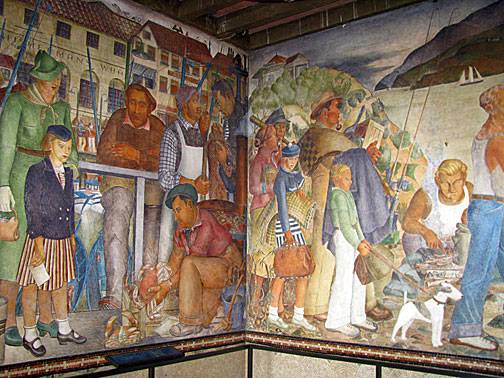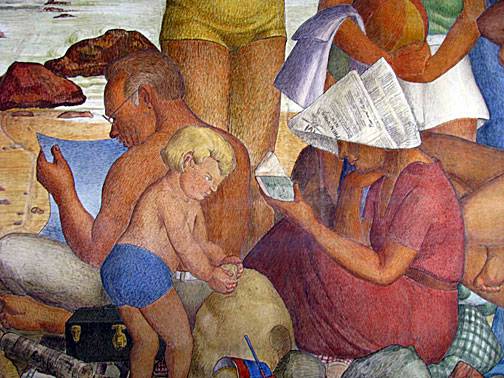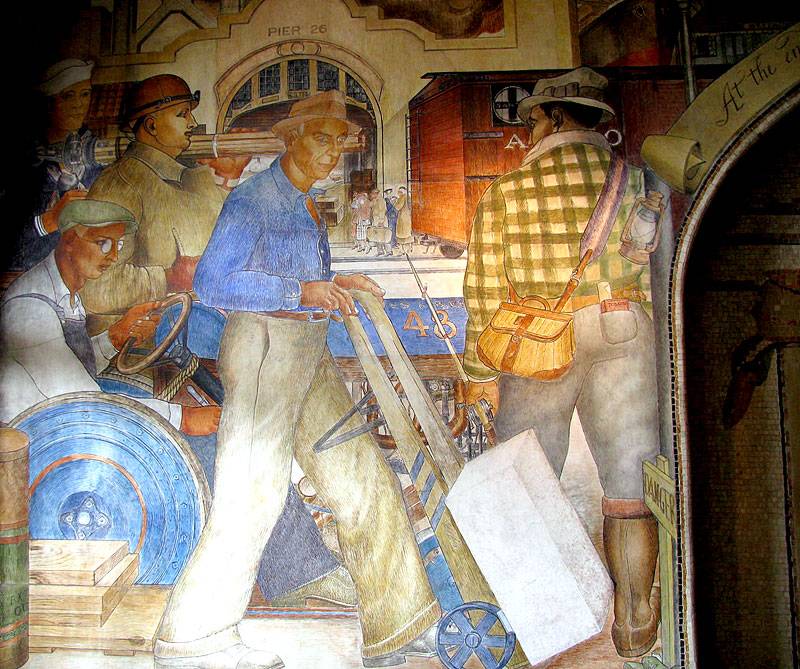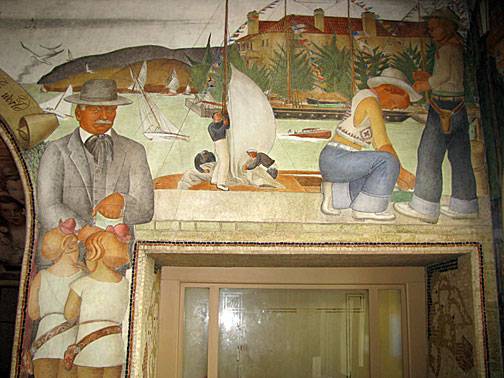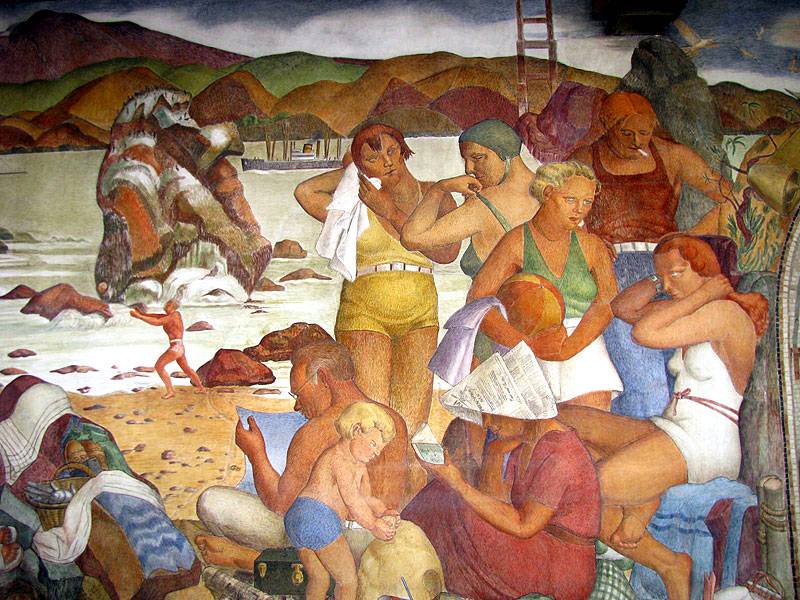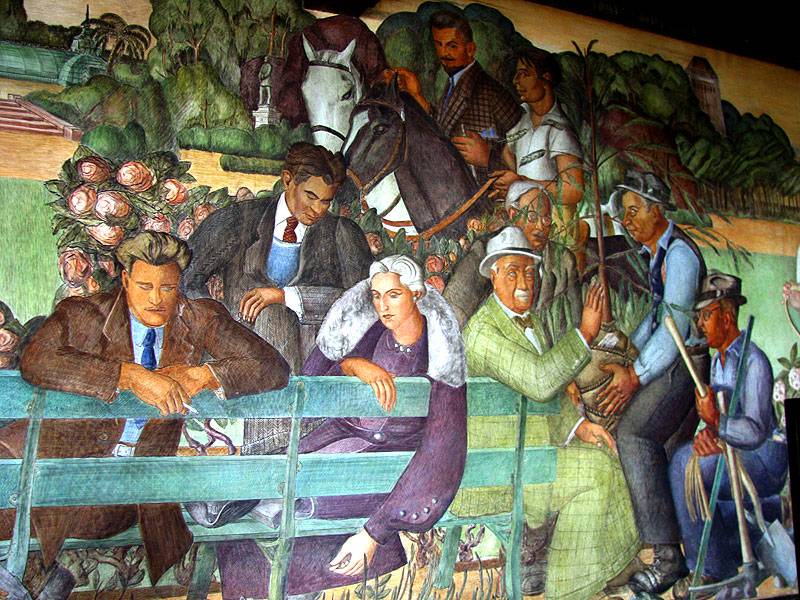Labaudt's Inspirational Beach Chalet Murals: Difference between revisions
m Protected "Labaudt's Inspirational Beach Chalet Murals": excerpted essay [edit=sysop:move=sysop] |
No edit summary |
||
| (One intermediate revision by the same user not shown) | |||
| Line 17: | Line 17: | ||
In Lucian Labaudt's San Francisco Beach Chalet scenes, equestrians, tennis players, and the Saint Francis Yacht Club inhabit the landscape. If, as reputed, a Beach Chalet waterfront scene includes a portrait of Labaudt's friend, labor organizer Harry Bridges, it is a Bridges peacefully wheeling a hand-truck, not leading the violent waterfront strike of 1934.91 | In Lucian Labaudt's San Francisco Beach Chalet scenes, equestrians, tennis players, and the Saint Francis Yacht Club inhabit the landscape. If, as reputed, a Beach Chalet waterfront scene includes a portrait of Labaudt's friend, labor organizer Harry Bridges, it is a Bridges peacefully wheeling a hand-truck, not leading the violent waterfront strike of 1934.91 | ||
[[Image: | [[Image:Labaudt produce-worker 3640.jpg]] | ||
'''Labaudt Mural at the Beach Chalet (detail of port scene)''' | '''Labaudt Mural at the Beach Chalet (detail of port scene)''' | ||
| Line 27: | Line 27: | ||
The message carried by New Deal art is clear: hard work will triumph over economic depression. By painting murals celebrating this American ideal, the artists were themselves working in a socially useful way, and the system was rewarding their hard work by paying them money for painting pictures in the middle of the worst economic catastrophe in the country's history. | The message carried by New Deal art is clear: hard work will triumph over economic depression. By painting murals celebrating this American ideal, the artists were themselves working in a socially useful way, and the system was rewarding their hard work by paying them money for painting pictures in the middle of the worst economic catastrophe in the country's history. | ||
'' | ''—excerpted from ''"Working to Prosperity: California's New Deal Murals" by Steven M. Gelber in'' California History magazine,'' Summer 1979, Vol. LVIII, No. 2 | ||
[[Image:Piazzoni-in-context 3661.jpg]] | |||
'''Labaudt, following the precedent set by many of his era's fellow artists to include other artists, depicts here Gottardo Piazzoni, a Swiss-Italian muralist who worked in San Francisco during the first two decades of the 20th century.''' | |||
''Photos: Chris Carlsson'' | |||
[[Image:Labaudt bathers 3649.jpg]] | |||
'''A variety of family, friends and students populate this bucolic beach scene, with the still under construction Golden Gate Bridge in the background. ''' | |||
[[Image:Labaudt McLaren-and-wealthy-patrons 3656.jpg]] | |||
'''Lucien Labaudt's Beach Chalet murals: John McLaren (G.G. Park Superintendent) in left foreground on bench, with Jack Spring (later General Manager of Parks and Rec Dept.) holding redwood tree's root ball, while behind on horseback sit sculptor [[Beniamino Bufano on Public Art|Benny Bufano]] and Joseph Danysh, then head of [[California's Not So Radical New Deal Murals | California Federal Art Project]].''' | |||
Latest revision as of 14:44, 10 October 2023
Historical Essay
by Steven M. Gelber
Panels from the Beach Chalet murals by Lucien Labaudt
California artists earnestly believed that their art should be inspirational, and they painted the world not as it was but as they wished it to be. Their heavy emphasis on themes of work reflected their belief that hard labor would again bring a happy, healthy, and even wealthy life. Accordingly, in a Coit Tower mural by Jane Berlandina, well-dressed couples dance to the music of a ukelele and grand piano at an elegant house party. On the tower's stairwells, beautifully turned-out San Franciscans parade up and down Powell Street in murals by Lucian Labaudt.
Lucian Labaudt included himself in this panel from the Beach Chalet, his back turned to the viewer as he reads the paper.
Photo: Chris Carlsson
In Lucian Labaudt's San Francisco Beach Chalet scenes, equestrians, tennis players, and the Saint Francis Yacht Club inhabit the landscape. If, as reputed, a Beach Chalet waterfront scene includes a portrait of Labaudt's friend, labor organizer Harry Bridges, it is a Bridges peacefully wheeling a hand-truck, not leading the violent waterfront strike of 1934.91
Labaudt Mural at the Beach Chalet (detail of port scene)
Photo: Chris Carlsson
In San Diego other artists painted prosperous equestrians and hunters, and in Santa Monica even polo players made an appearance.92
The message carried by New Deal art is clear: hard work will triumph over economic depression. By painting murals celebrating this American ideal, the artists were themselves working in a socially useful way, and the system was rewarding their hard work by paying them money for painting pictures in the middle of the worst economic catastrophe in the country's history.
—excerpted from "Working to Prosperity: California's New Deal Murals" by Steven M. Gelber in California History magazine, Summer 1979, Vol. LVIII, No. 2
Labaudt, following the precedent set by many of his era's fellow artists to include other artists, depicts here Gottardo Piazzoni, a Swiss-Italian muralist who worked in San Francisco during the first two decades of the 20th century.
Photos: Chris Carlsson
A variety of family, friends and students populate this bucolic beach scene, with the still under construction Golden Gate Bridge in the background.
Lucien Labaudt's Beach Chalet murals: John McLaren (G.G. Park Superintendent) in left foreground on bench, with Jack Spring (later General Manager of Parks and Rec Dept.) holding redwood tree's root ball, while behind on horseback sit sculptor Benny Bufano and Joseph Danysh, then head of California Federal Art Project.

